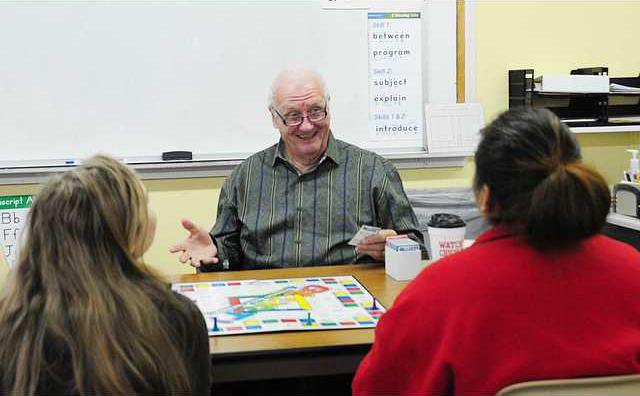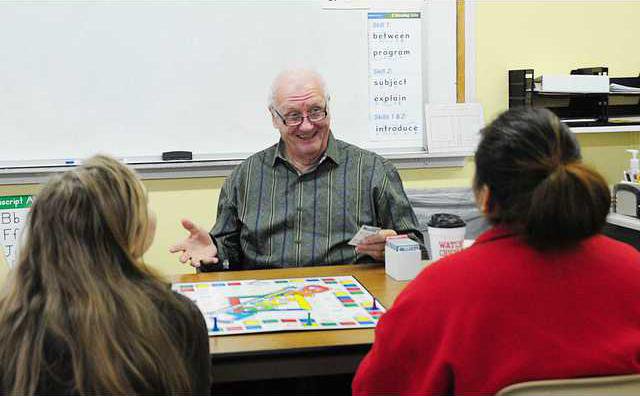The giving spirit
This holiday season, The Times each day spotlights a person or couple who give of themselves to help others in the community. Today, meet John Harris, who uses his international experience to help educate others with the Gainesville/Hall County Alliance for Literacy.
Volunteer with Gainesville/Hall County Alliance for Literacy
Contact: 770-531-4337, all4lit@bellsouth.net
John Harris refuses to be a wet leaf.
"The Japanese have an expression that translated into English means ‘wet leaves.' It refers to their husbands who worked for 20 hours a day for the last 50 years and suddenly they're retired and they go in and out of the house and cause a mess," Harris said.
"I can't do that. I can't just sit down."
Instead, Harris spends his time teaching adults how to read with the Gainesville/Hall County Alliance for Literacy.
"He is just a gem," said Dorothy Shinafelt, executive director of the alliance. "He has been so committed to the students and the program. ... He works in our basic reading class which serves those with a zero to fourth-grade reading level."
Harris was born in England and came to the U.S. in 1967 on a scholarship from Ford Motor Co. After a career with Ford and Kubota took him to 11 different countries, he settled down in Hall County to work with the Gainesville Kubota branch.
His contract with Kubota ended in 2009.
"I had no hobbies and was really trying to find what I wanted to do," Harris said. "I was actually looking through The Gainesville Times classifieds and I saw an add that was there from Dorothy Shinafelt. It said they were looking for tutors for various subjects including reading."
Harris got involved with the alliance not to "give back" — he said he gets more out of it than his students sometimes — but to give others a chance to get a job.
"I've done a lot of hiring over my time," Harris said. "I saw a lot of résumés. I was just appalled by the lousy quality of a lot of the résumés, even from kids in college or men with college degrees. I got into this volunteer thing for reading, but I was really turned on by ‘Hey, if people who are being educated can't write and read properly, how about the people who don't have the advantage of going to college?'"
Many people in Harris' class want to get their GED, but some are there for other reasons.
"I've had grandfathers who want to learn to read so they can read to their grandchildren," he said.
"It's a mixture of people who've never gotten an education for whatever reason. It's a real mix of starting almost with ABC on some and on others just kind of getting them over the hump to the next level."
Harris teaches two classes from 9 a.m. to 1:30 p.m. Thursdays.
"The first class, because we have a few less students, we are even able to do one-on-one. And everyone starts off on the computer, learning sounds through headphones," Harris said.
It is this class where two types of students are found: those who need the push and those who don't get reading at all.
"In my second class, which is better populated, they're all at a fairly high level and we try and get some competition in there," Harris said. "We have word games and vocabulary games where we give them the definition and they have to give us the word."
He claims he's more educated now than he ever was in school. Traveling allowed him to learn about people and read more. He takes these skills into the classroom, determining what type of teaching students need to succeed, be it speaking softer, being more patient or constantly reminding them of what they're doing.
Harris said most people can read mechanically, but comprehension is another story.
"We ask them, ‘What did you just read? Do you know what you just read? What was it about? Do you know someone like that in the story?'" he said. "We try to explain to them that reading is like a movie, but you make up the movie in your head. A lot of people have never thought about it that way."
Harris taught reading once before.
"When I did this in Pennsylvania many years ago it was a one-on-one thing," Harris said. "We used to teach mostly Russian people and we'd bring in circulars from the advertising section of supermarkets and we'd take them through what they are in English."
He also volunteers at the Spout Springs Library.
"I probably do the library work three or four days a week for a couple hours," he said. "I like it. There are a lot who don't know how a library is set up to start with, that there's a fiction and non-fiction section."
Harris said he was blessed with teachers who gave him the love of the written word, but his education goes beyond a four-walled classroom to his international experiences.
"I've seen things that I don't want to see in terms of poverty. I've seen women in some countries trying to offer you their babies," Harris said.
"It's amazing to see how wonderful a country this is after you've seen the shacks people live in ... where they pipe in water and power but they all live in containers from General Motors."
One such experience involved Harris' driver, who was held up at gunpoint for his wallet at a red light. The driver turned over his wallet, and afterward assured Harris he did not need to be reimbursed by the company — the wallet he gave the gunman was full of folded paper, not money. He kept it in his pocket in case something ever happened.
"As a businessman, I was just fascinated on how you handle people across the table. If you're negotiating with a Japanese person, they'll sit there in silence for an hour because they know Americans are impatient and want it settled this morning, so they'll just wait you out," Harris said. "Koreans can become almost offensive in their tone in negotiations; Italians become emotional and wave their hands."
He speaks English, French and Portuguese, and speaks enough Dutch, Danish and Swedish to get by.
His next language goal is to learn Spanish, but his real goal is to see his students achieve.
"I have a little part in that, at a more mature age for people that for whatever reason missed the boat, had to work so they didn't have school after third grade or claimed they were home-schooled but really they weren't," Harris said. "It's probably one of the most worthwhile things I've done in my life."

